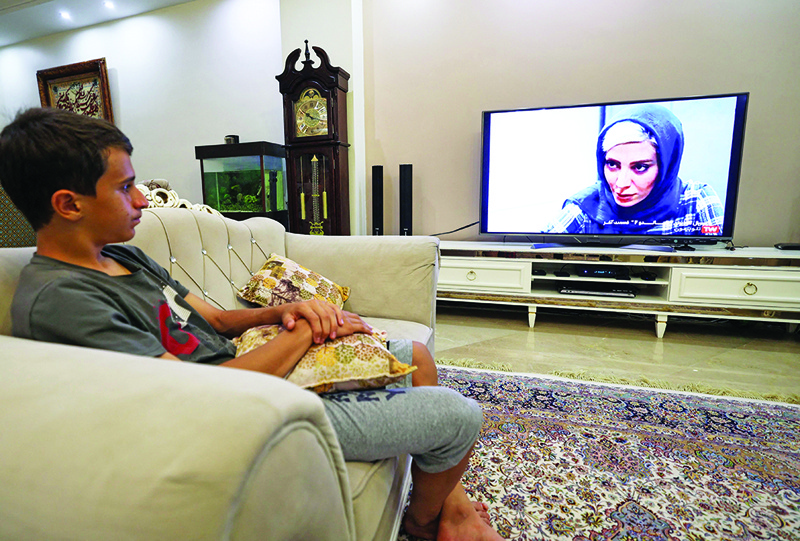 A young man watches an episode of the Iranian television series "Gando" at his home in Iran's capital Tehran.—AFP
A young man watches an episode of the Iranian television series "Gando" at his home in Iran's capital Tehran.—AFPLoathed by Iran's moderates, television spy series "Gando" with its plots mirroring the headlines has gone back on air since ultra-conservative President Ebrahim Raisi's election victory. Named after a local species of crocodile known to ambush its prey, Gando's stars are counter-espionage agents of the Revolutionary Guard, operating from a control room festooned with monitors, much like in the US thriller "24". The series is lauded by ultra-conservatives, but the real draw for many-and the possible reason why state television pulled it for several months before its return in July-has been its attacks on former president Hassan Rouhani's government.
Rouhani oversaw the 2015 nuclear deal with world powers to curb Iran's nuclear program; the US withdrew under Donald Trump and the deal was also anathema to Iran's own ultra-conservatives. Rouhani served two consecutive terms, the maximum permitted by the constitution, and was succeeded by Raisi, who won a June presidential election. In March, the sixth episode of Gando's second season triggered fierce debate with a plotline featuring a spy among Iran's nuclear negotiators.
By the 13th episode of the show, broadcast five days a week, the plug was pulled without explanation. It had been portraying the government, especially the foreign ministry, as packed with weak figures, cowards and the corrupt. In contrast, protagonist Mohammad-the counter-espionage hero of the Guards-is shown shadowing foreign agents from the moment they reach Iranian soil, especially spies from Britain's MI6.
'Revelations'
Last month, Iran's judiciary authority announced that two people had been convicted, one for corruption and another for espionage, after verification of certain "revelations" made in the series. The show itself was widely seen by commentators in Iran as part of efforts to undermine Rouhani. Following the end of broadcasts in the spring, some media reported that the Rouhani government had written a complaint to Iran's supreme leader Ali Khamenei about the show, arguing it was harming the functioning of the government.
Several ultra-conservatives accused the Rouhani government of being behind the halt, a charge it denied. Rouhani's foreign minister, Mohammad Javad Zarif, one of the figures ridiculed in the series, said it was nothing but "lies from beginning to end" and had damaged him personally.
For its part, the ultra-conservative newspaper Kayhan in August hailed the "revelations" made in Gando, including of alleged links between senior officials and foreign missions, "in particular the British embassy". Although Iranian officials usually hold the US and Israel as the Iranian state's greatest foes, neither has an embassy in Tehran.
'Let BBC broadcast it'
One character, British spy Charlotte who is in Tehran under cover as a diplomat, is played by Beaina Mahmoudi, a member of Iran's Armenian Christian minority. Defying typical Iranian censorship practice, under which women on TV are shown wearing headscarves even in situations where they would not be required to in reality, Charlotte is depicted in several indoor scenes going bareheaded. Fars news agency, reputed to be close to Iran's ultra-conservative camp, has described Charlotte as a fictionalized version of Kylie Moore-Gilbert.
Moore-Gilbert is an Australian-British researcher convicted of spying for Israel and freed two years later in a 2020 prisoner exchange for three Iranians held over an attack allegedly planned in Bangkok. She has always denied the charges against her. A third season of Gando has already been floated that would deal with the nuclear talks. "In any case, I like Gando season 2 very much," British ambassador to Iran, Simon Shercliff, wrote on Twitter in Persian. The response from Iran's state broadcasting chief Abdollali Ali-Asgari: "We suggest the BBC broadcasts it if he likes it." - AFP











